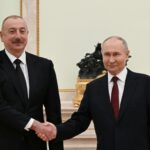Nikol Pashinyan is central to the question of peace in the region. Pashinyan came to power in a colour revolution uprising in 2018 that ousted corrupt post-Soviet Armenian leaders. Pashinyan’s instincts are those of a political leader seeking to build a democratic society in Armenia and re-orientate the country from its over-reliance on Russia to Europe.
Pashinyan is the first Armenian leader who is not from the Karabakh region and has no links to the large diaspora. He is therefore distrusted by the pro-Russian lobby in the Ministries of Defence and Foreign Affairs and by the Kremlin which has always distrusted leaders who have come to power in colour revolutions. The Kremlin has always viewed colour revolutions as CIA-backed conspiracies seeking to undermine Russia’s sphere of influence in Eurasia.
Pashinyan is the first Armenian leader who recognises that Armenia can only develop economically if it is at peace with its neighbours. Peace treaty has been negotiated – but not yet signed – with Azerbaijan accompanied on a parallel track of the normalisation process with Turkey. The signing of the peace treaty would reduce Russia’s influence in the South Caucasus and facilitate greater integration with Europe.
Pashinyan faces domestic pressure to not agree on Karabakh becoming part of Azerbaijan. There is though no alternative to them as international borders for former Soviet republics must be based on internal boundaries that had existed between them. Of the fifteen former Soviet republics, only Russia and Armenia have baulked at transforming internal republican boundaries into international borders.
In the Soviet Union, Karabakh was part of the Azerbaijani Soviet republic and the UN adopted several resolutions declaring the region to be part of Azerbaijan’s sovereign territory. Emotions and nationalism about where Karabakh should belong need to be replaced by pragmatic steps towards peace that include safeguards and guarantees for the Armenian minority that has declined over the years of occupation and especially after the 2020 Karabakh war to approximately 50,000.
Armenia could resume its negotiations, which it ended under Russian pressure in 2013, with the EU for an Association Agreement. Armenia would be able to also join Georgia and Turkey in benefitting economically from the energy corridors in the South Caucasus emanating in Azerbaijan.
Azerbaijan would be able to expand its energy supplies to Europe, which partially offset those which used to be imported from Russia. With peace on its western border secured, Azerbaijan would be able to focus on countering the major threat to its national security from Iran.
Russia’s war in Ukraine provides opportunities for the EU to expand its influence into a region that is strategically important to its energy security. Russia’s invasion of Ukraine has severely undermined its image as a military power and reduced its ability to project power into its self-declared Eurasian sphere of influence. With Pashinyan seeking to sign peace treaties with Armenia’s neighbours, Armenia is a weak link in Russia’s sphere of influence. Peace treaties would end the need for Russia’s ineffective so-called “peacekeepers.”
Russia’s last card is to parachute into Karabakh oligarch Ruben K. Vardanyan to oppose Karabakh being included inside Azerbaijan and eventually to replace pro-Western Pashinyan with a pro-Russian puppet. Vardanyan made billions in Russia in the 1990s at a time when this was impossible to do without breaking laws that allowed Russian intelligence services to collect damning kompromat on you. The Kremlin has a long record of using kompromat to blackmail oligarchs and state officials to implement its goals.
The South Caucasus stands at a crossroads. Although pre-occupied by the war in Ukraine and China, the US needs to back up the EU’s brokering of a peace treaty between Armenia and Azerbaijan. This would in turn facilitate the normalisation process between Armenia and Turkey. The resultant decline in Russian influence would improve the West’s energy security that has now become independent of Russia.
The US, Israel and Turkey have strategic interests in curbing Iranian Islamic extremism and military aggression. Azerbaijan has long been a target for Iranian extremism – as seen in the recent terrorist attack on its Embassy in Tehran. Iran’s military alliance with Russia is a threat to Western backing for Ukraine in its war with Russia from which it is receiving sophisticated weaponry and possibly nuclear weapons technology. Israel and Ukraine are the only two countries in the world threatened by Iran and Russia respectively with being wiped off the face of the earth.
Dr. Taras Kuziuo is a professor of political science at the National University of Kyiv Mohyla Academy and author of the just published Genocide and Fascism. Russia’s War Against Ukrainians.










